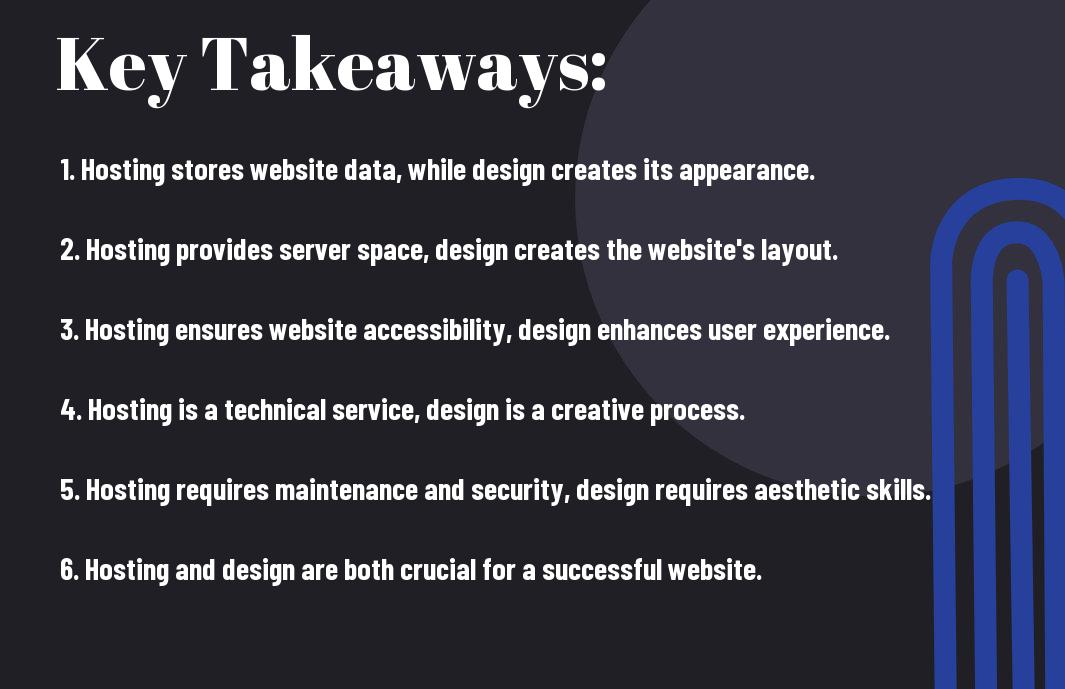Have you ever found yourself confused by the differences between website hosting and web design? It’s essential to understand the distinction between the two in order to properly manage your online presence. Website hosting refers to the service that allows you to make your website accessible to the world wide web. It’s essentially the home for your website, providing storage, bandwidth, and other necessary resources. On the other hand, web design involves the actual creation and layout of your website, including the use of visual elements, usability, and user experience. While website hosting is crucial for making your site available, the design is what draws in and engages your visitors. Both aspects are equally important, and understanding the difference will allow you to make informed decisions about your online presence.
<
>Understanding Website Hosting<
>
Before we dive into the differences between web hosting and web design, it’s important for you to understand the concept of website hosting. This aspect of your website is crucial to its performance, security, and overall success.
<
>Definition and Function of Website Hosting<
>
Website hosting refers to the service that allows you to publish your website or web application on the internet. Essentially, it provides the technology and resources needed to make your website accessible to users on the web. The function of website hosting is to store your website files, such as HTML, images, videos, and more, on a server that is connected to the internet, ensuring that your website is available 24/7 to visitors.
<
>Types of Web Hosting Services<
>
There are several types of web hosting services available, each catering to different needs and requirements. Some of the main types include shared hosting, virtual private server (VPS) hosting, dedicated server hosting, and cloud hosting. Each type has its own set of features, benefits, and drawbacks, so it’s important to choose the one that best suits your specific needs. When selecting a web hosting service, consider factors such as the amount of traffic you expect, your budget, and the level of technical expertise you possess.
- Shared hosting: Most affordable option, but resources are shared with other websites on the same server.
- Virtual private server (VPS) hosting: Offers more flexibility and control than shared hosting, as it simulates a dedicated server within a shared hosting environment.
- Dedicated server hosting: Provides the highest level of performance and control, as you have an entire server to yourself.
- Cloud hosting: Offers scalability and reliability, as your website is hosted on a network of virtual servers.
After considering which type of web hosting service best meets your needs, you can make an informed decision to ensure the optimal performance and security of your website.
Exploring Web Design
Some people often confuse web hosting with web design. However, they are two completely different aspects of creating a website. Web design involves the overall look and feel of a website, including the layout, color scheme, graphics, and interactive features. It focuses on creating an aesthetically pleasing and user-friendly interface for your audience. Understanding the key elements and principles of effective web design is crucial for a successful online presence.
The Role of Web Design in Online Presence
When it comes to establishing your online presence, web design plays a crucial role. It is the first impression you make on your audience. Your website’s design can either captivate or drive away potential visitors. A well-designed website not only attracts users but also encourages them to explore your content and take the desired actions. Your web design should reflect your brand identity and effectively communicate your message to your audience. It is essential for creating a positive and memorable user experience.
Elements and Principles of Effective Web Design
The elements and principles of effective web design are fundamental to creating a successful website. The layout, color scheme, typography, imagery, and navigation are all crucial elements that contribute to the overall user experience. Paying attention to details such as contrast, balance, and alignment can significantly impact how users perceive and interact with your website. It is important to consider these elements and principles when designing your website to ensure it effectively conveys your brand message and engages your audience. Understanding and implementing these key elements and principles will help you create a compelling and impactful web design for your online presence.
Comparing Website Hosting and Web Design
Your website hosting and web design are two critical components of creating and maintaining a successful online presence. Understanding the difference between the two can help you make informed decisions about your website’s development and management. Here’s a breakdown of the key distinctions between website hosting and web design:
| Website Hosting | Web Design |
| Refers to the physical location of your website | Refers to the visual and functional aspects of your website |
| Provides server space for storing your website’s files and data | Focuses on creating an attractive and user-friendly interface for your website |
| Ensures your website is accessible to users on the internet | Involves coding, layout, and graphic design to create the look and feel of your website |
| Typically involves a monthly or annual fee | May be a one-time cost or ongoing expense, depending on the scope of the project |
How Hosting and Design Interact
Your website hosting and web design are closely intertwined. Your hosting provider ensures that your website is available to visitors on the internet, while the design determines how users interact with your site. Without reliable hosting, your well-designed website may not function properly or be accessible to users. Conversely, a poorly designed website may not effectively utilize the features and resources provided by your hosting service.
Key Differences and Considerations
When considering website hosting and web design, it’s important to understand the differences and their respective considerations. Choosing the right hosting plan is crucial for ensuring your website’s performance and security, while an effective web design can enhance user experience and contribute to the success of your online endeavors. By understanding the distinctions between these two aspects, you can make informed decisions that align with your web development goals.
Making the Right Choice for Your Website
Keep in mind that the success of your website depends on the choices you make regarding hosting and web design. To help you make an informed decision, you need to understand the differences between website hosting and web design. For a detailed comparison, you can refer to this Website builder vs web hosting: What’s the difference? article.
Factors to Consider When Selecting Hosting Services
When choosing a hosting service for your website, there are several factors that you need to consider. These include reliability, security, speed, scalability, and customer support. It’s essential to select a hosting provider that ensures 99.9% uptime, offers SSL certificates, provides fast loading times, and can accommodate the growth of your website. Additionally, reliable customer support is crucial for addressing any issues that may arise. This will ensure that your website remains accessible and secure, providing a positive experience for your visitors. This is especially important if you operate an e-commerce website, as any downtime could lead to lost sales.
Importance of Professional Web Design
When it comes to web design, the appearance, functionality, and user experience of your website are vital to its success. A professionally designed website can attract and engage visitors, ultimately leading to higher conversion rates and sales. Your website should be responsive, visually appealing, easy to navigate, and reflect your brand identity. A professional web designer can help you achieve these goals, ensuring that your website stands out from the competition and leaves a lasting impression on your audience.


With these considerations, you now understand the difference between website hosting and web design
Web hosting and web design are two distinct but interconnected aspects of building and maintaining a website. Your website hosting provides the server space and technical infrastructure for your website to exist, while web design encompasses the visual and functional elements of the site itself. Understanding the difference between the two is crucial for creating a successful online presence. For more information on the topic of Web Hosting vs Website Builder, check out this resource from HostGator.
CATEGORY:Uncategorized

